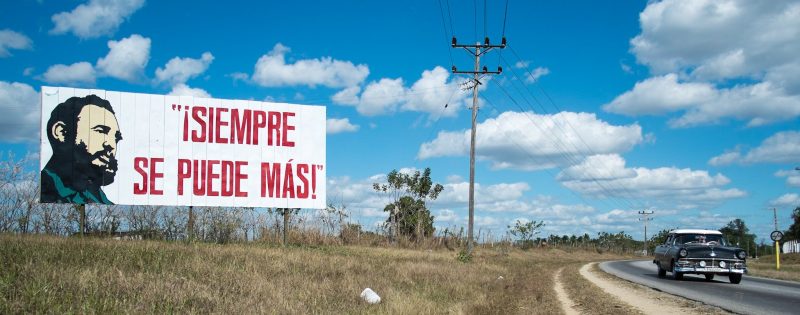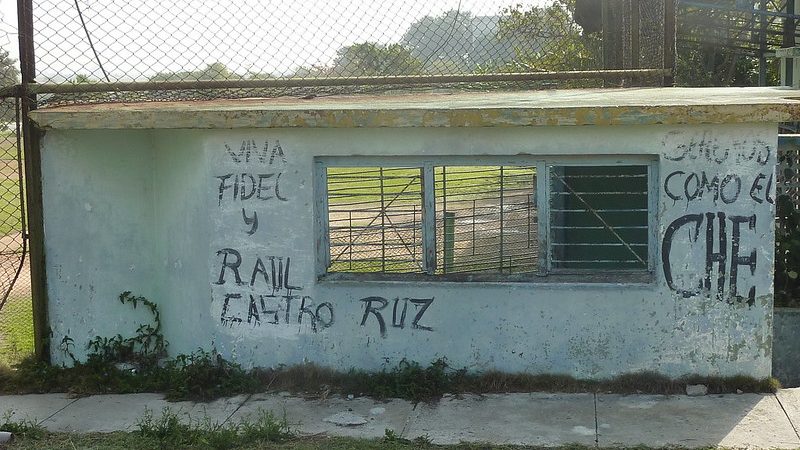
Photo by The Capture/Flickr (CC BY-NC-ND 2.0)
This article was written by an author in Cuba, under the pseudonym “Luis Rodriguez.”
I was born in a small village in the south of Cuba, surrounded by the poverty that my family endured, but filled with the type of love and affection that I have never known again in my life. This was the Cuban version of the Macondo described by Gabriel García Márquez in “One Hundred Years of Solitude”—a time when poverty and migration had not yet deteriorated and fractured the Cuban family.
It took me a long time to manage to wake up from the deception that has led me and many of my generation to have defended the Marxist ideology and its utopian vision of the world. This awakening has been full of clashes.
The distant memories I have of my childhood are associated with sugar—azúcar—a magical word that Celia Cruz, the Cuban singer exiled in the U.S., always used to sing about, because the small village where I grew up was part of a region that depended economically on the sugar industry.
Back then, no one in Cuba would have suspected that Fidel Castro would shut down the sugar mills in 2004. In addition to the structural weaknesses of the Cuban government, such as excessive bureaucracy, corruption, the centralized economy, and the drastic restriction of private initiative, the combined problems caused by drought, the collapse of its major sugar partner, the Soviet Union, and the U.S. blockade worsened the country's economy.
But this is how it felt to me: the Cuban Revolution wrecked everything, it was disrespectful to tradition and our identity. Cuban sugar as well as coffee, rum and tobacco are symbols rooted in the social consciousness. Many of the thousands unemployed from the sugar industry had to either fall back to the hard work in the fields, to self-employment, or to sink into the darkness and the uncertainty of depending on the black market, considered in Cuba as one of the main escape valves.
When I return to my hometown from time to time to visit my relatives, it pains me to see the decline and misery that plagues the everyday life of many villages formerly living off the sugar industry in Cuba, and I am moved by the longing that many people feel for a world that has collapsed before their very eyes.
This world, frustrating and decadent, has been masterfully depicted in the Cuban film Melaza by independent filmmaker Carlos Lechuga.
Indoctrination and awakening
Human beings in Cuba are subjected to indoctrination during childhood in elementary schools. The daily ritual consisted of absurd and repetitive morning lessons filled with slogans that made no sense to me. It was a mechanical process where each child repeated the words “pioneers for communism, we will be like the Che.”
When I was a boy I saw reality as something natural, as if this totalitarian world that repressed human dignity was something natural and accepted by everyone. You were not allowed to have ties with foreigners either, but at that time the only tourists I had ever met were Soviets and others coming from communist countries, who saw the Cuban reality as something very natural.
Fortunately, as I grew up and gained access to information, I found out that the communist paradise that was described to me as if it were the gospel, the so-called reign of the “New Man” was, in fact, the complete negation of what I had been taught, the farthest thing from the reign of social justice that it was proclaimed to be. Rather, it was nothing short of hell, not only because of the scarcity and shortages that have always plagued the daily lives of the Cuban people but also because of the lack of liberty, a tragedy that has worsened with the passing of time. Nowadays, expressing your ideas in the Cuban public space is a risky act, and exercising independent journalism can lead you to jail.
Notwithstanding, I enjoyed that period of my existence, bathing in the rivers and drinking the exquisite guarapo, sugar cane juice, that I used to drink when I traveled on a rickety bicycle to the nearest sugar mill.

Photo from Seb/Flickr (CC BY-NC-ND 2.0)
Among the saddest memories I have of those early years of my life is one of me walking past a church as if it were a forbidden place. The ideology of state atheism reigned in Cuba in the eighties, and you could not practice any religion, whether evangelical or Yoruba.
In high school, I joined the Union of Young Communists (Unión de Jóvenes Comunistas, UJC, in Spanish) with the same inertia that many adolescents and young people in my country did, and then I went to split my pre-university studies with agricultural work under adverse conditions in the countryside. On several occasions I contracted skin diseases because I did not have soap to bathe and wash the sheets I slept in, but the greatest impact it left on me, and I will never forget it, was the verbal abuse that a young, religious man, whom I have never seen again, used to endure at night.
Every time I went to visit my family during that period I was very shocked to see them cooking with firewood and having hardly any food to offer me, and the tears that silently rolled down my face awakened in me the question of whether that reality was fair and whether it had any connection with the Marxist-Leninist doctrine that I was taught. Such a bleak picture was the beginning of the awakening of my conscience, of my conviction that another way of life was possible.

Photo from Seb/Flickr (CC BY-NC-ND 2.0)
My awakening to libertarianism and the realization of the injustice caused by totalitarianism was a long and painful process. Many people have experienced the feeling of prolonged deception. There was an unbridgeable gulf between the reality Cubans lived and the communist rhetoric touted by its leaders. The luxurious life practiced by the leaders contradicted the discourse of austerity they promoted.
At a time when I had no access to literary works such as George Orwell's 1984, Eudocio Ravines’ The Great Swindle, or Gene Sharp's From Dictatorship to Democracy, I became convinced that the only way to live a dignified life was in a democratic society, even though I knew practically nothing about democracy.
Little by little, the interactions with Cubans living in exile on their trips to the island to visit their relatives were the best examples of life in a free country and of the deceit of the communist rhetoric about capitalism.

Photo from Cary Lee/Flickr (CC BY-NC 2.0)
My awakening came to maturity when I was studying art history at university and I discovered the immense horizon of information that the internet opened up for me.
From then on, I had access not only to the aforementioned literary works but also to other texts such as Karl Popper's The Open Society and The Unbearable Lightness of Being by the Czech author Milan Kundera, The Man Who Loved Dogs by the Cuban Leonardo Padura, German films such as The Lives of Others (2006) about the persecution of intellectuals by the STASI in the former German Democratic Republic, Goodbye Lenin and the documentary film Overthrowing a Dictator about the resistance of the Otpor (“Resistance” in English) organization and its role in getting rid of Slodovan Milosevic's regime in Serbia. These works had an extraordinary influence on my thoughts on democracy.
The internet is a liberating tool that has enabled me to interact with the rest of the world and experience the advantages of the global village, to experience the sensation that, behind the iron curtain surrounding Cuba, there is a world resting on the pillars of freedom and progress.
This long journey has convinced me that there is no alternative for Cubans but to fight for our freedom, the only way to rebuild our country on the ruins of the sugar mills—symbols of a past and of a stolen hope.







